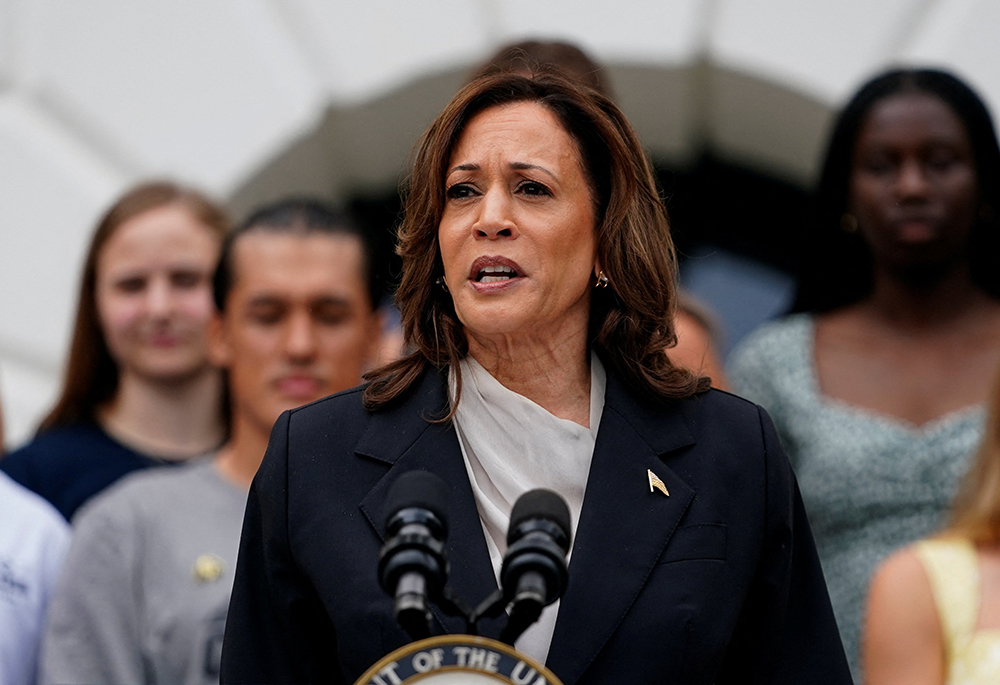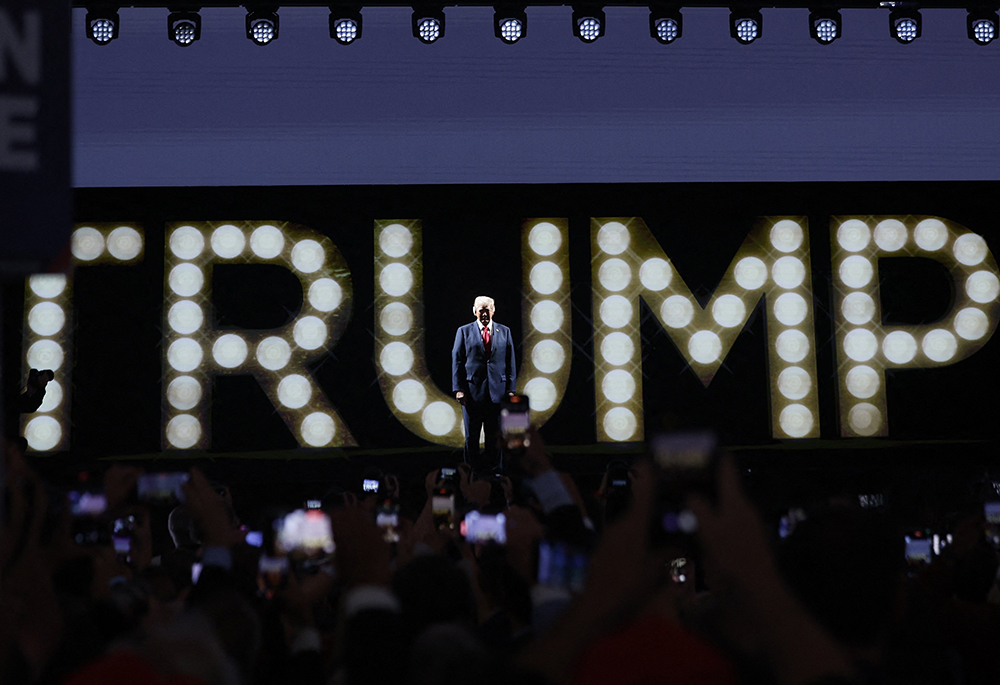
Vice President Kamala Harris delivers remarks to the National Collegiate Athletic Association champion teams in her first public appearance after President Joe Biden dropped out of the 2024 race, on the South Lawn of the White House July 22 in Washington. (OSV News/Reuters/Nathan Howard)
If religion demands anything of the believer in the public square it must be the desire to look beneath the surface of whatever issues, debates and controversies dominate a particular moment. When you get past the partisan lenses and the ideological lenses and the identity politics lenses, all the things that have become polarized and intransigent, we might find that which is truly human. At this moment in the history of our nation, this is not as easy as it sounds.
Recently, however, we have been getting some significant help in this effort to look beneath the surface, to start on a path that might lead us out of the polarized cul-de-sac in which our politics and our culture are stuck.
In my newsletter Tuesday (July 30), I called attention to an essay by philosopher Michael Sandel. (If you don't get my newsletter, you can sign up for it here.) Sandel grasps the role economics plays in our present polarization as few others do. Both Democrats and Republicans can cite plenty of statistics to make their case. But Democrats, including President Joe Biden and Vice President Kamala Harris tend to treat inflation as a statistic and, just so, their correct claim that it has been tamed doesn't address the deeper problem. He writes, "Inflation is not merely about the price of eggs. Many voters experience it as an assault on their agency, a daily marker of their powerlessness: No matter how hard I work or how much I make, I can't get ahead or even keep up." This is how people talk about it over coffee after Mass.
Sandel adds, "Reimagining the economy and renewing our sense of shared citizenship may seem like separate undertakings. … But they are part of the same political project. Economic arrangements not only decide the distribution of income and wealth; they also determine the allocation of social recognition and esteem." If I were a member of Harris' speechwriting team, I would focus on this: The economic policies of the Biden-Harris administration, from bringing back manufacturing to making the tax code more fair, have faced serious headwinds as the economy recovered from the pandemic and all the dislocations and disruptions Covid caused, but they are aimed at empowering people.
Neoliberal policies, followed more or less by both parties until Biden and Harris took office in 2021, created a massive disempowerment for working class people. And neither party had a solution. Sandel writes:
Rather than contend directly with the damage they had done, both political parties told workers to improve themselves by getting college degrees. The politicians said: What you earn will depend on what you learn; you can make it if you try. The elites who offered this advice missed the implicit insult it contained: If you're struggling in the new economy, it's your fault. This galling mix of economic injury and credentialist condescension helped propel Mr. Trump to the presidency.
And, while Biden's policies began to rollback neoliberal policies, the president never worked those changes into a larger narrative of national renewal. "His presidency was a legislative triumph but an evocative failure," Sandel concludes.
Another incisive essay, also in the Times, came from Farah Stockman. In what may be the best lede this year, she begins: "Is America an idea or a homeland? That question lies at the heart of this roller coaster of a presidential race."

Republican presidential nominee and former U.S. President Donald Trump takes the stage to deliver his acceptance speech July 18, on the fourth and final day of the Republican National Convention at the Fiserv Forum in Milwaukee. (OSV News/Reuters/Evelyn Hockstein)
Stockman notes the different ways people who understand America as a homeland are susceptible to the contemptible prescriptions offered by former President Donald Trump, his sidekick, Sen. JD Vance, and the MAGAverse. If America is "an idea," it belongs to anyone, which is why immigration is so prominent in GOP attacks. As well, "The modern world can be disorienting, as people lose their vital ties to the places they are from. The rise of cellphones, social media and globalized commerce has created a sense of 'placelessness' that often robs people of the rootedness that human beings need to flourish." She notes, "The impulse to reclaim a sense of place in the world could be part of why nationalism is on the rise in many countries."
Stockman sympathizes with the plight of working-class Americans even while she recognizes the repugnance of alt-right efforts to turn a sense of belonging into a vicious thing. Those who seek to defeat Trump and the moral ugliness that he brings need to understand the source of their appeal, make the case that belonging is not a zero-sum game, and paint a vision for the country's future that includes a future for the working class.
The third item was a conversation at the Aspen Ideas Festival I listened to on NPR's "1A." "1A" host Jenn White interviewed Vidhya Ramalingam, CEO of Moonshot, which examines the sources of extremism, and documentary filmmaker Alexandra Pelosi whose latest film interviews people who had been charged in the insurrection on Jan. 6. "First of all, I want to say we can't paint them all with the same brush," Pelosi said. She discussed how the role of toxic misinformation shaped the attitudes and ideas of those who engaged in what turned out to be the ugliest attack on our civilian government in over a century. She recalled one man whose husband had never seen footage of the assault on the U.S. Capitol. If you watch Fox News, it was all tourists and there was a protest that got out of hand.
Ramalingam said that she went into the project thinking "these people are all monsters, and I am never going to understand them" but that what surprised her the most was "it didn't feel entirely irrational." She noted, "There wasn't just one journey into hate." There were people with Ph.D.s and people who had been homeless who ended up in hate groups. The uniting factor was a desire to belong to something bigger than themselves, an altruistic sentiment gone horribly wrong. Pelosi hit similar notes.
Advertisement
The whole discussion is fascinating. The most important underlying theme was that if you avoid debating facts or ideology, and get to the underlying desires these people evidence, the ideology can fall aside. The most important point of entry both women found examining hate groups and in talking to those who had been convicted of crimes in relation to the insurrection was the idea that they had been manipulated.
At the end of the discussion, White asked what question she would like the audience to ask themselves. Pelosi's answer was stunning: "We all think that we are right and that our worldview is. I mean, I was indoctrinated into a political cult at an early age, and I'm right. I've lived in San Francisco and New York, that's my life experience, so I'm right. But what if I'm wrong? What if I'm wrong about everything? So, I guess my question is: What if you're wrong? What if everything I believe is actually wrong?" I shall be wrestling with that question for a long time.
For the Christian, looking beneath the surface of the polarization of the culture is related to the search for Christ. "The mission of proclaiming the good news of Jesus Christ has a universal destination," Pope Francis wrote in Evangelii Gaudium quoting the 2007 Aparecida document issued by the bishops of Latin America. "Its mandate of charity encompasses all dimensions of existence, all individuals, all areas of community life, and all peoples. Nothing human can be alien to it." The pope uses this quote to set up his examination of social questions. Do we?
We know Trump has connected evocatively with working-class Americans but offers only hateful solutions, which are no solutions at all, to the underlying problems identified by Sandel, Stockman, Ramalingam and Pelosi — still less to the hope offered by Pope Francis! If Harris and the Democrats can listen to the insights these four commentators provide, they might not only win in November, but win in such a way that they can start binding the nation's wounds.







